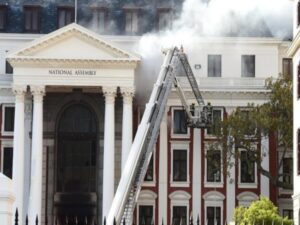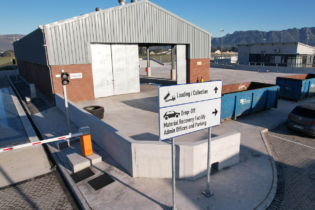After a fire in 2022 destroyed the historic building, Parliament’s officials have handed over the site to demolition contractors to begin the rebuilding project.
“Today, it is both a great pleasure and a privilege to announce a significant milestone in our journey towards renewal,” Secretary to Parliament, Xolile George, said on Thursday. He told the media that the building project is expected to be completed within two years. “The initial phase of the rebuild project will involve the demolition of structurally unsafe sections of the building, which have been designated as the ‘red zone’ due to their instability and compromised safety,” he explained. The removal of these areas, he said, requires specialised expertise and machinery, particularly given the historical and heritage significance of the building. “This delicate process ensures that we preserve as much of the original architectural integrity as possible while making way for new, safe structures. This careful and precise approach underscores our commitment to maintaining the building’s heritage while safeguarding its future.” In January 2022, a fire severely damaged the historic Parliament building, including the National Assembly Chamber, hundreds of offices belonging to Members of Parliament (MPs) and staff, and parts of the Old Assembly Chamber. The fire is believed to have started at the National Assembly building before it engulfed the adjacent Old Assembly, which was built in 1983 to accommodate the expanded needs of the Tricameral Parliament. “The fire that gutted these buildings on that fateful morning of 2 January 2022 did not only destroy the brick and cement structures of the precinct but also much of the invaluable history that resided between these walls. “The recently upgraded broadcast technology in the House and the artworks showcasing our indigenous knowledge systems and traditional arts were also destroyed,” George explained. Although the fire caused a devastating loss of significant fabric, he said recovery remains possible.The damaged sections of the buildings will be cleared this month to start rehabilitation works by August 2024.
“They are structurally unsafe, and work must be undertaken under careful and controlled engineering approaches to prevent injuries and loss of life and to ensure that the sections that were not affected by the fire remain intact.” George said they envisage an outcome that reflects a reimagined and democratised Parliamentary complex that meets both functional and practical needs and reflects the democratic character of South Africa. In addition to accommodating the enlarged Assembly chamber and support spaces, the rebuilding process will incorporate modern technology and infrastructure. Asset register Shifting his focus to Parliament’s assets, these have been verified and a register has since been updated based on their net book values. “The loose rubble and debris were removed, and assets were recovered for offsite storage. The fire did not affect some assets but had close to zero book value.” He stated that the disposal of these assets is underway in line with Parliament’s Supply Chain Management Policy and Procedures. “The involvement of the public in rebuilding our Parliament is not just important, it is essential. Parliament belongs to the people of South Africa. As such, it must reflect their will, aspirations, and hopes in terms of not only its constitutional mandate but also its heritage and practical usefulness.” George also unveiled a special website dedicated to the Parliament rebuild project, which is a platform that hosts the new architectural designs, detailed project outlines, overviews, and conceptual frameworks.






